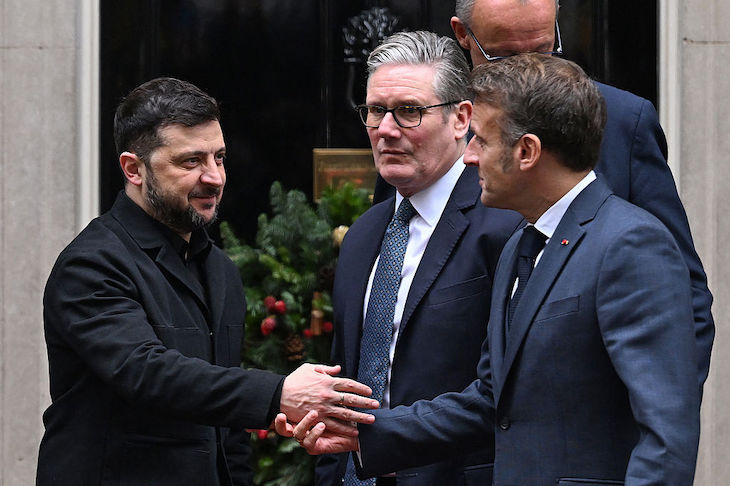The government’s iron determination to surrender the Chagos Islands to Mauritius is puzzling. Why are ministers so keen to hand over territory that has been British since 1814, which is home to a critical UK-US military base, to a country thousands of miles away? And why does Britain need to pay Mauritius a reported £9 billion for the privilege of giving up its own territory?
Initially, the government stuck to making vague noises about international law. The deal with Mauritius was necessary, parliament and the public were told, because the International Court of Justice (ICJ) had said that the UK had to hand over the islands, never mind that the ICJ opinion in question was an advisory one which is not legally binding on Britain or on anyone else.
Now, under immense public pressure to justify a deal that seems to combine national humiliation with very significant financial costs, the government has advanced a new set of rationales. According to the newly articulated public justification, the deal with Mauritius is necessary because, without it, Mauritius would be able to obtain a binding judgment from an international court declaring that the Chagos Islands belong to Mauritius.
Surrendering sovereignty to Mauritius would be an unforced geopolitical error
Mauritius could then leverage this judgment to interfere with the use of the radio spectrum at Diego Garcia, working with the International Telecommunication Union (ITU) to disrupt the operations of the UK–US military base. The deal is therefore necessary to secure the future of Diego Garcia in the interest of national security.
But as we show in a new report for Policy Exchange, the government’s new justifications have no basis in reality. The ITU, a specialised organ of the United Nations based in Geneva, has no powers of enforcement. As one of its spokesmen put it, the ITU ‘has no international enforcement mechanism. It is more a gentleman’s agreement.’ It cannot stop the UK or the US from transmitting on the radio spectrum allocated to the Chagos Islands, not least because it does not control the radio spectrum.
In fact, the ITU excuse is so flimsy that it has already been contradicted by none other than the government itself. Last week, in response to a question in parliament, Sir Chris Bryant, the Minister of State for Data Protection and Telecoms, informed the House of Commons that ‘Individual countries, not the ITU, make their own sovereign spectrum assignments… The ITU has no legal authority over these assignments regardless of the country’s civilian or military classification of spectrum. The ITU cannot challenge the UK’s use of civilian or military spectrum.’
With or without the ITU’s support, it is open to Mauritius to attempt to interfere with Diego Garcia’s telecommunications, by, for instance, attempting to jam signals from and to Diego Garcia, or by purporting to authorise a foreign power to use the spectrum associated with the British Indian Ocean Territory. However, if it acted in this way it would, for good reason, be treated as a hostile state by the UK and the US and would suffer retaliation from both. The government’s stated fears that Mauritius may soon attempt to interfere with British and American military operations in the Chagos also contradict its claims that Mauritius is a trustworthy partner of the West.
This is not to mention the fact that many would say that the ITU has been institutionally captured by China and other authoritarian states, which have not so long ago used the body to advance their authoritarian agenda for state control of the internet. To cede territory on the basis of possible future action by such a compromised body would be foolish indeed.
As to the insistence that unless it surrenders now the UK inevitably faces the prospect of a binding judgment requiring cession, it is just as incredible. International law is based on the principle of state consent, which means that no state is subject to the jurisdiction of an international court unless it agrees to be subject to that jurisdiction.
The UK has never consented to any international court – and there aren’t that many of them – making a binding decision over the sovereignty of the Chagos Islands, and as long as it maintains this position no international court can challenge the UK’s sovereignty. Indeed, the fact that ministers cannot even name the court that would make a binding ruling is proof that such an occurrence is impossible.
But why does the government act as though such a court existed and was poised to give judgment? The likely reason is found in new legal risk guidelines set out in late 2024 by Lord Hermer KC, the Attorney General. The new guidelines direct civil service lawyers to assume that a legal challenge will be brought, even if there is no court which has jurisdiction to hear the challenge. In other words, even where there is no legal threat whatsoever, the government’s lawyers have to pretend that there is a threat, and advise accordingly.
Such are the flimsy foundations on which the government has built its case to justify the cession of the Chagos Islands. Surrendering sovereignty to Mauritius would be an unforced geopolitical error, not the performance of legal duty. There is still time for the government to back away from this ill-considered deal, which will severely compromise British security for nothing in return.
Yuan Yi Zhu is a Senior Fellow at Policy Exchange and an Assistant Professor of International Relations and International Law at Leiden University







Comments